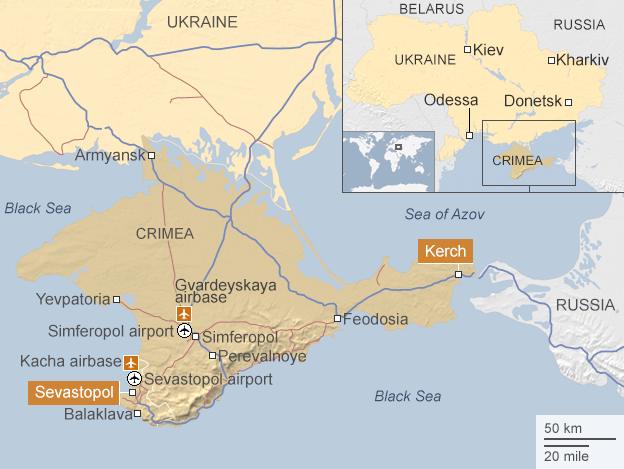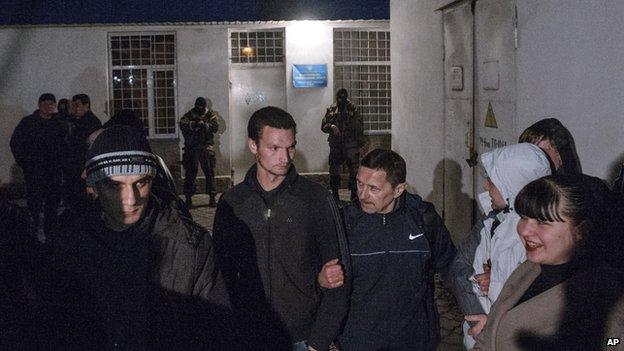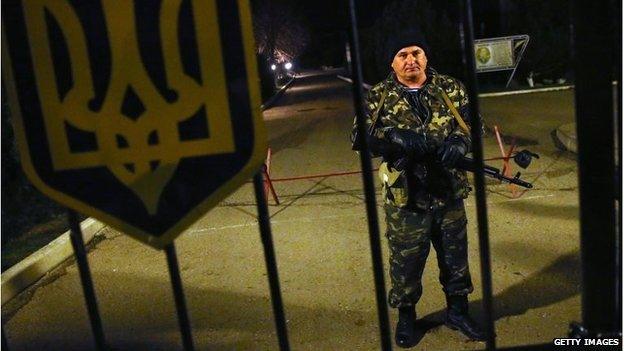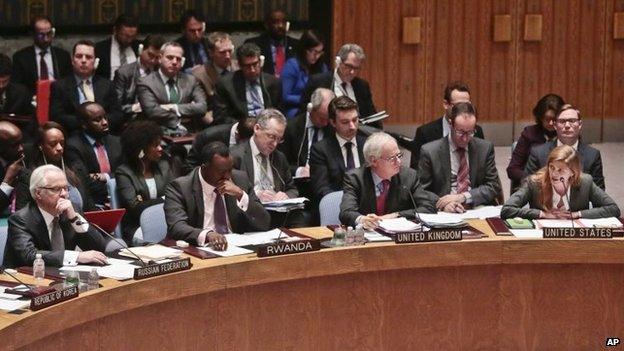Ukraine's Yanukovych asked for troops, Russia tells UN
- Published
Russia says ousted Ukrainian President Yanukovych asked for military aid
Ousted Ukrainian President Viktor Yanukovych asked Russia to send troops across the border to protect civilians, Moscow's UN envoy has claimed.
Vitaly Churkin told a Security Council meeting Mr Yanukovych wrote to Russian President Vladimir Putin on Saturday.
Thousands of Russian troops have been pouring into Ukraine's Crimea region.
Russian forces have also been holding military exercises near Ukraine's borders, but now Mr Putin has ordered them back to base, the Kremlin says.
Ukraine said Russia had set a deadline for its forces in Crimea to surrender by 03:00 GMT. So far there have been no reports of any incidents.
Russia has denied issuing any ultimatum.
The Kremlin has argued in favour of the intervention, which has sparked outrage and threats of economic sanctions from the US and EU.
Western ambassadors dismissed Russia's arguments as groundless.
US Secretary of State John Kerry is on his way to Kiev to meet Ukraine's new leaders and show support for the country's sovereignty.
Meanwhile, Ukraine's UN envoy Yuriy Sergeyev says Russia has deployed about 16,000 troops to the peninsula.
Ukrainian defence sources accused Russia's Black Sea Fleet chief Aleksander Vitko of threatening a full-scale assault if they did not surrender by dawn on Tuesday.
A Russian spokesman later denied that any ultimatum had been issued.
Ukrainian military personnel besieged in their bases waited nervously for the deadline to pass, many of them preparing for an attack by Russian troops and pro-Moscow militias.
However, a deputy commander at one of Ukraine's units, named only as Major Lisovoy, told local ATR TV that there were no attempts to storm the base.
"We're all in high spirits, ready to defend our base. There was no official ultimatum, it was done indirectly via mobile phones. I want peace and stability, and for Ukraine to be a united country."

Build-up
The Kremlin has established de facto military control in Crimea. There are growing fears that it might try to seize more land in eastern Ukraine, where a number of people support closer ties with Moscow.
Ukrainian officials say reports suggest there is also a Russian military build-up near Ukraine's eastern border.
In another development, the Pentagon said it was putting on hold all military-to-military engagements between the US and Russia. These include exercises, bilateral meetings, port visits and planning conferences.
However, a Pentagon spokesman said that "there has been no change to our military posture in Europe or the Mediterranean".
Crimea, Ukraine's autonomous republic, and several cities in south-eastern Ukraine have been rocked by instability since Mr Yanukovych was ousted last month.
Russia wants the current government in Kiev to be replaced by a broad coalition representing what it calls all political forces in the country, with presidential elections being held in December.
'Imaginary threat'
At the UN in New York, Mr Churkin offered the Security Council a copy of the letter Mr Yanukovych had sent.
He said the ousted leader had described Ukraine as on the brink of civil war, with civilians being persecuted simply for speaking Russian.
Ukraine's officials deny this, pointing out that an overwhelming majority of people in Crimea and well as in a number south-eastern cities in Ukraine's mainland speak Russian in their day-to-day lives.

In Sevastopol pro-Russian activists formed a human chain outside the Ukrainian Navy headquarters overnight

Surrounded Ukrainian soldiers had a nervous wait - but the Russian deadline passed without incident

Vitaly Churkin (L) and Samantha Power (R) were both uncompromising in the Security Council meeting
Mr Churkin quoted from the letter: "I would call on the president of Russia, Mr Putin, asking him to use the armed forces of the Russian Federation to establish legitimacy, peace, law and order, stability and defending the people of Ukraine."
Mr Churkin reiterated Moscow's view that Mr Yanukovych is Ukraine's legitimate leader, not interim President Olexander Turchynov.
Western ambassadors refused to accept Russia's justification, continuing to accuse Moscow of violating international law.
"Russian mobilisation is a response to an imaginary threat," said US envoy Samantha Power.
"Military action cannot be justified on the basis of threats that haven't been made and aren't being carried out."
One Ukrainian navy officer said his forces were facing intense pressure from Russia to support them
UK ambassador Mark Lyall Grant also rejected Russian allegations of terrorism and threats against ethnic Russians in Ukraine.
"It is clear that these claims have simply been fabricated to justify Russian military action," he said.
He dismissed Mr Yanukovych's letter to President Putin as meaningless.
A number of Western nations have urged Russia to withdraw its troops and accept international observers in Ukraine.
The US and EU have threatened sanctions including possible travel bans and targeted economic measures.
However, a British official was photographed holding policy documents that suggest the UK will not seek to curb trade with Russia or close London's financial centre to Russians.